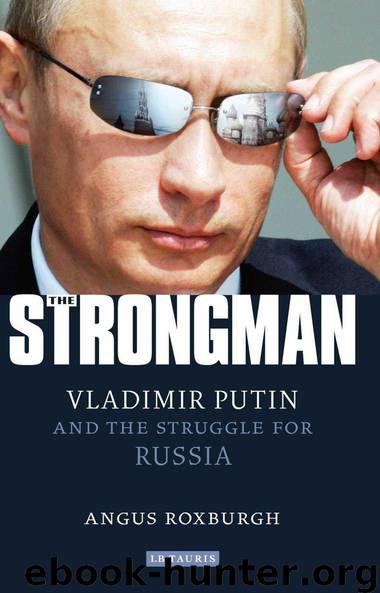Strongman, The by Roxburgh Angus

Author:Roxburgh, Angus [Roxburgh, Angus]
Language: eng
Format: epub
ISBN: 9780857730367
Publisher: IB Tauris B
Published: 2011-02-11T23:00:00+00:00
9
MEDIA, MISSILES, MEDVEDEV
A Western PR machine
Two thousand and six should have been a landmark year in Russia’s post-communist history, and in President Putin’s campaign to bring his country back to prominence as a respected and valued player on the world stage. Russia had become a member of the G8 group of leading industrialised nations in 1997, and this year, for the first time, it was its turn to chair it – a chance to shape the global agenda and to impress with a flawless summit in July, to be hosted by Putin in his home town, St Petersburg.
As we have seen, however, the year began with Russia cutting off gas supplies to Ukraine – hardly the image it was looking for. In the preceding months Putin had already unnerved the West with a series of moves aimed at tightening his own grip on power and stifling the opposition, including his curbs on NGOs and the unleashing of the youth group Nashi to cow both political opponents and uppity foreign ambassadors.
Already there were calls from conservative quarters to expel Russia from the G8, or at the very least for President Bush to boycott the St Petersburg summit.
In the gloomy corridors of the presidential administration, hidden behind the dark-red walls of the Kremlin, they came up with a novel idea: Russia needed to project its image better. They needed a Western public-relations company to help them. There was no tender.1 Personal contacts led them to a leading New York PR firm, Ketchum, and a European partner, GPlus, based in Brussels. The most senior executives from the two companies flew into Moscow and made a joint pitch to Putin’s press secretary Alexei Gromov, and his deputy Dmitry Peskov. (The two men divided the role of spokesman between them: Gromov was in overall charge, but the fluent English-speaker Peskov dealt almost exclusively with the foreign press.)
It was at this point that the directors of GPlus – former journalist colleagues of mine – asked me to join their team as chief Russia consultant. Much of this chapter is based on my experiences there.
We saw our main task as Kremlin advisers as a rather simple one: to teach the Russians about how the Western media operate and try to persuade them to adopt the best practices of government press relations. We were advisers, not spokespeople. But whereas the Westerners who advised Boris Yeltsin’s government on economics in the 1990s were beating on an open door, advising Putin’s team on such an ‘ideological’ subject as media relations was never going to be so easy. Peskov did, in fact, show great interest in studying Western practices, but after some initial success we watched our ‘client’ drifting back into their old ways. As the Politkovskaya murder was followed by the Litvinenko murder, and then by the Russian invasion of Georgia, I began to wonder whether the very reason the Kremlin had decided to take on a Western PR agency was because they knew in advance that their image was about to nosedive.
Download
This site does not store any files on its server. We only index and link to content provided by other sites. Please contact the content providers to delete copyright contents if any and email us, we'll remove relevant links or contents immediately.
| Arms Control | Diplomacy |
| Security | Trades & Tariffs |
| Treaties | African |
| Asian | Australian & Oceanian |
| Canadian | Caribbean & Latin American |
| European | Middle Eastern |
| Russian & Former Soviet Union |
The Secret History by Donna Tartt(19092)
The Social Justice Warrior Handbook by Lisa De Pasquale(12190)
Thirteen Reasons Why by Jay Asher(8912)
This Is How You Lose Her by Junot Diaz(6888)
Weapons of Math Destruction by Cathy O'Neil(6281)
Zero to One by Peter Thiel(5802)
Beartown by Fredrik Backman(5756)
The Myth of the Strong Leader by Archie Brown(5509)
The Fire Next Time by James Baldwin(5447)
How Democracies Die by Steven Levitsky & Daniel Ziblatt(5219)
Promise Me, Dad by Joe Biden(5154)
Stone's Rules by Roger Stone(5088)
A Higher Loyalty: Truth, Lies, and Leadership by James Comey(4964)
100 Deadly Skills by Clint Emerson(4926)
Rise and Kill First by Ronen Bergman(4790)
Secrecy World by Jake Bernstein(4753)
The David Icke Guide to the Global Conspiracy (and how to end it) by David Icke(4720)
The Farm by Tom Rob Smith(4514)
The Doomsday Machine by Daniel Ellsberg(4490)
